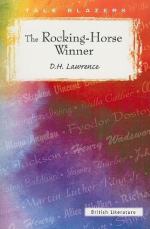|
This section contains 253 words (approx. 1 page at 400 words per page) |

|
The Rocking-Horse Winner Summary & Study Guide Description
The Rocking-Horse Winner Summary & Study Guide includes comprehensive information and analysis to help you understand the book. This study guide contains the following sections:
This detailed literature summary also contains Bibliography and a Free Quiz on The Rocking-Horse Winner by D. H. Lawrence.
D. H. Lawrence's "The Rocking-Horse Winner" was first published in 1926 in Harper's Bazaar magazine. It was published again that same year in a collection that was put together by Lady Cynthia Asquith, a friend of Lawrence's. Some critics have argued that the characters in the story are modeled after Asquith and her autistic son. Lawrence's works are known for their explorations of human nature through frank discussions of sex, psychology and religion. Lawrence's later short stories, such as "The Rocking-Horse Winner," display a movement toward tabulation and satire as opposed to his earlier short fiction, which reflected more the traditional nineteenth-century English short story— anecdotal, or tales of adventure. "The Rocking-Horse Winner" is a sardonic tale employing devices of the fairy tale and a mockingly detached tone to moralize on the value of love and the dangers of money. In "The Rocking-Horse Winner" and other later stories, Lawrence moved beyond the strictures of realism and encompassed a broader range of styles and subjects than in his earlier work. Critics view "The Rocking-Horse Winner" as an example of Lawrence's most accomplished writing. Lawrence is considered a modernist, a member of a literary school opposed to the literary conventions of nineteenth-century morality, taste, and tradition. Evident in "The Rocking-Horse Winner" is Lawrence's distain for conspicuous consumption, crass materialism, and an emotionally distant style of parenting popularly thought to exist in England during the late nineteenth and early twentieth centuries. Thus, the story is considered by many to be an example of modernist prose.
Read more from the Study Guide
|
This section contains 253 words (approx. 1 page at 400 words per page) |

|



